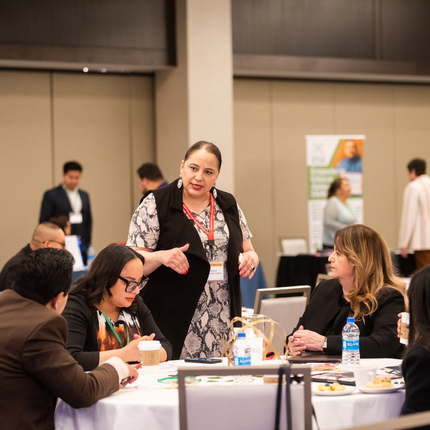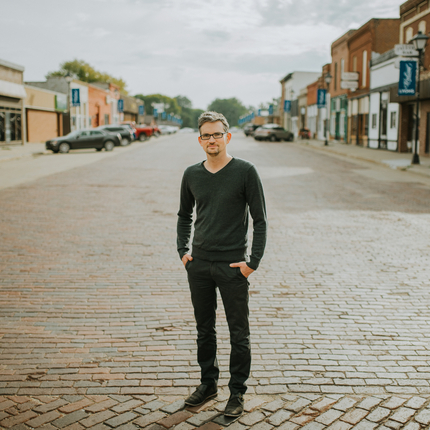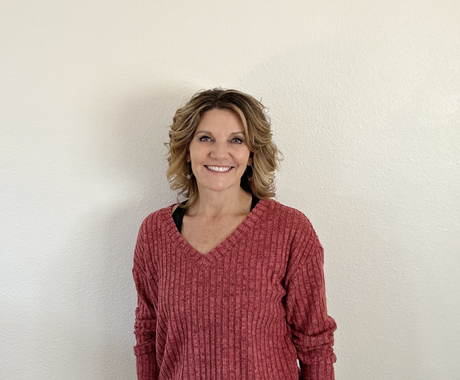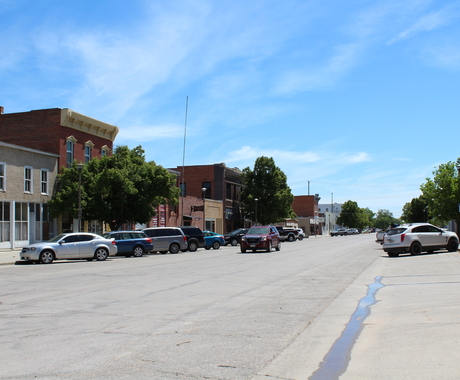When the Center for Rural Affairs was founded in 1973, its focus was on federal policy. Today, the organization’s work includes capital access, community development, and small business and clean energy policy, in addition to rural federal policy.
Executive Director Brian Depew has had a front row seat in the Center’s role in rural America, watching and leading change since 2007. He has observed the evolving work, and says it’s because the organization is designed to be responsive to changing needs.
“Over time, the economic landscape, the policy landscape, demographic landscape of the communities where we work has shifted,” he said.
The organization tackled consolidation in agriculture in the 1970s, and the Center’s policy work has continued to curb that consolidation.
“But, we also dealt realistically with the fact that it has occurred and it’s part of the reason we need to be more attentive to a broader set of economic drivers in our communities,” Brian said. “It’s part of the reason that we had to be more attentive to small business development, why we had to be more attentive to new immigration, why we had to be more attentive to harnessing opportunities like what’s in front of us now with clean energy as a new economic driver.”
This responsiveness has kept the Center relevant and vibrant as well as proving the organization is a leader in the rural space nationwide.
How Brian found out about the Center
Brian was born in Pennsylvania and moved to the family farm in Iowa when he was 10 years old. His dad discovered the Center, sent a donation, and started receiving its newsletter, which Brian remembers reading when he was young.
“As a teenager, you have these feelings about the world around you that you haven’t put a voice to yet,” he said. “I remember reading the Center for Rural Affairs newsletter and thinking, ‘Yeah, that’s what I think about the world.’ So, the Center helped me articulate what I thought about things around me as I grew up in a rural community.”
Brian left home to attend college and graduate school. While he was a graduate student, he sent a donation to the Center to start getting the newsletter once again. That’s where, a few years later, he saw a job announcement and applied for a position.
“It’s quite the story,” he said. “Not only did I know about the Center from when I was a kid, and not only did I come to work here, but then I stayed and had the opportunity to become executive director of this organization that I remember reading about in the newsletter in high school.”
Brian’s journey with Center
Since 2007, Brian has worked on nearly every topic at the Center, starting as a policy organizer, focusing on the farm bill.
He then worked on Nebraska state policy and led organizing efforts around health care and what became the Affordable Care Act.
As policy director, Brian helped initiate new clean energy policy work. Then, he served as assistant executive director, overseeing communications, constituency, the newsletter, and the website.
He became executive director in 2013, which gave him a chance to cultivate and launch new initiatives in lending, farm, and community work.
“Guiding the Center through change has been most fulfilling,” Brian said. “The organization is always evolving to remain relevant, always trying to be a pragmatic change advocate, and always looking for new solutions to challenges that communities face. Helping navigate through change is both challenging and fulfilling.”
Center’s evolving work
“The Center is a really unique organization compared to our peers,” he said. “We work at the nexus of economic opportunity, community development, and environmental sustainability. There are hardly any other organizations that do all of those things.”
In addition, the organization is guided by a consistent set of values.
The Center has its roots in the farm movement, he said, but its mission quickly evolved.
“I think the staff and board very early on realized that the Center needed to address a broader set of rural community issues,” he said. “Today, we take a more holistic approach to small businesses, community well-being, and rural communities.”
Within the past 20 years, the Center has responded to changing demographics of rural communities by including new immigrants in community development and lending work.
“You see it come to full fruition today with quite a lot of diversity compared to a lot of peer organizations, both in staffing as well as in our programs,” Brian said. “As the demographics in rural communities evolved, the organization evolved.”
What’s in store for the Center?
“The Center has long understood that access to capital—who has money and what they can do with it—matters a great deal to things that we care about,” Brian said. “The Center has been on a decades-long evolution to build a broader set of capital access programs.”
For 30 years, the Center deployed capital in small business development only, functioning as a small business lender since 1990. It expanded its lending capabilities in 2013 after becoming a Community Development Finance Institution. Since 2020, it has added lending in the areas of single-family housing, multi-family housing, and now small meat and poultry processing loans. Planning is underway for new lending programs in food systems and solar energy.
“I’m convinced if we want to have the ability to shape the future of our communities, we have to control some of the capital as a community-based organization,” Brian said. “And we have to deploy that capital in a variety of ways that cuts across an increasing number of our programs and goals.
“You can see now, we’re deploying capital in a broader set of ways to address housing, sustainable food systems, and climate change. We can use capital as a tool, and when we align capital with our mission, it can be a key strategy to advance our goals. I think that’s part of what we’re building for the future.”
Featured photo (top): While the Center’s focus in 1973 was on federal policy, the work has evolved to include support for small business and to respond to rural America’s diverse demographics. Pictured is the annual Latina Women’s Business Conference, offered in Spanish. | Photos by Kylie Kai
Featured photo (bottom): Executive Director Brian Depew says responsiveness has kept the Center relevant and vibrant as well as proving the organization is a rural leader.






